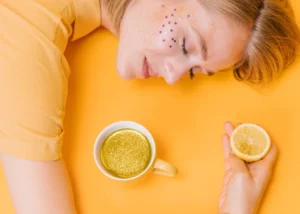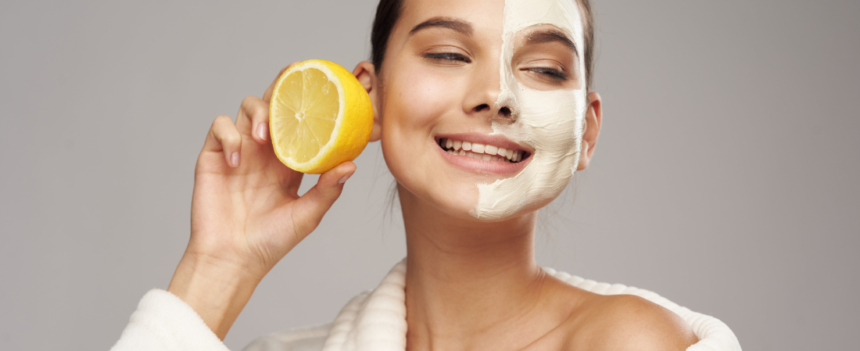Introduction
We’ve all been there. You look in the mirror and notice those pesky dark spots on your face. Whether from sun exposure, aging, or leftover marks from acne, dark spots can make you feel self-conscious about your skin. But don’t worry; you’re not alone, and there are natural remedies that can help! Today, we’re diving into one of the most popular and effective natural solutions: wellhealthorganic.com : remove dark spots on face tang – lemon juice
Lemon juice has been a go-to ingredient in beauty routines for ages. It’s cheap, easy to find, and packed with skin-loving nutrients. But how does it work to lighten dark spots, and is it right for you? Let’s explore everything you need to know about this zesty fruit and how it can help you achieve a clearer, more radiant complexion.
Understanding Dark Spots
Before we get into the nitty-gritty of using lemon juice, we must understand what dark spots are and why they appear. Dark spots, also known as hyperpigmentation, are areas of the skin that become darker than the surrounding skin. They can appear anywhere on the body but are most common on the face, hands, and other areas frequently exposed to the sun.
Common Causes of Dark Spots:
- Sun Exposure: UV rays from the sun increase melanin production in the skin, leading to sunspots or age spots.
- Hormonal Changes: Pregnancy, birth control pills, and menopause can trigger melasma, a type of hyperpigmentation.
- Post-Inflammatory Hyperpigmentation (PIH): This occurs after skin injuries like cuts, burns, or acne heal, leaving behind dark marks.
- Aging: As we age, our skin’s ability to repair itself slows down, resulting in more visible dark spots.
Why Lemon Juice?
Lemon juice is a favorite among natural skincare enthusiasts for a reason. It’s a powerhouse of skin benefits, especially regarding brightening and evening out skin tone. Here’s why lemon juice works so well:
- High in Vitamin C: Lemon juice is rich in vitamin C, a potent antioxidant known to reduce melanin production. This helps to lighten dark spots and brighten the overall complexion.
- Citric Acid Content: The citric acid in lemon juice acts as a natural exfoliant. It helps remove dead skin cells, making dark spots less visible over time and promoting new cell growth.
- Natural Astringent: Lemon juice can tighten the skin and reduce excess oil, which is especially beneficial for people with oily or acne-prone skin.
- Antibacterial Properties: Lemon juice has natural antibacterial properties that can help prevent acne and reduce the risk of post-inflammatory hyperpigmentation.

How to Use Lemon Juice to Remove Dark Spots
Now that you know why lemon juice is effective, let’s talk about how to use it safely and effectively on your skin. Follow these steps for the best results:
- Step 1: Gather Your Ingredients
- Fresh lemons
- A small bowl
- Cotton balls or a clean cloth
- Water (optional)
- Step 2: Prepare the Lemon Juice
- Cut a fresh lemon in half and squeeze the juice into a small bowl.
- If you have sensitive skin, dilute the lemon juice with equal water. This reduces its acidity and minimizes the risk of irritation.
- Step 3: Apply the Lemon Juice
- Dip a cotton ball or clean cloth into the lemon juice.
- Gently dab the juice onto the dark spots on your face. Be careful to avoid the eyes and any open wounds.
- Step 4: Let It Sit
- Leave the lemon juice on your skin for about 10-15 minutes.
- If you feel any burning or irritation, rinse it off immediately.
- Step 5: Rinse Off
- After 10-15 minutes, rinse your face with cool water.
- Pat your skin dry with a clean towel.
Tips for Safe Use of Lemon Juice
While lemon juice is a fantastic natural remedy, it’s important to use it safely to avoid potential side effects. Here are some tips to keep in mind:
- Always Use Fresh Lemon Juice: Fresh juice is free from preservatives that can irritate your skin.
- Test for Allergies: Before applying lemon juice to your face, do a patch test on a small area of your skin to check for allergic reactions.
- Use Sunscreen: Lemon juice can make your skin more sensitive to the sun, so always apply sunscreen before going outside.
- Avoid Overuse: Using lemon juice too frequently can dry your skin or irritate it. Stick to 2-3 times a week.
Alternatives to Lemon Juice for Removing Dark Spots
If lemon juice isn’t your thing, don’t worry! There are plenty of other natural remedies that can help lighten dark spots. Here are a few alternatives recommended by WellHealthOrganic.com:
- Aloe Vera: Known for its soothing properties, aloe vera can help reduce inflammation and promote skin healing. Apply fresh aloe vera gel directly to dark spots and leave it on overnight for best results.
- Turmeric: This spice has powerful anti-inflammatory and antioxidant properties that can help reduce hyperpigmentation. Mix turmeric with milk or honey to form a paste, apply it to your dark spots, and rinse off after 15 minutes.
- Honey: A natural moisturizer, honey can help fade dark spots and improve skin tone. Apply honey to your face and rinse off after 20 minutes.
- Apple Cider Vinegar: The acetic acid in apple cider vinegar can lighten pigmentation and improve skin appearance. Mix apple cider vinegar and water in equal parts, apply to dark spots with a cotton ball, and rinse off after a few minutes.
- Papaya: Rich in enzymes, papaya can exfoliate the skin and reduce the appearance of dark spots. Mash a ripe papaya and apply it to your face as a mask for about 20 minutes.

FAQs
Q1: How long does it take to see results with lemon juice?
A: Results can vary depending on the severity of the dark spots and your skin type. Some people may see results in at least two weeks, while others may take longer. Consistency is key!
Q2: Can I use lemon juice every day?
A: It’s best to use lemon juice 2-3 times weekly to avoid skin irritation or dryness. Overuse can lead to sensitivity and potential damage to the skin barrier.
Q3: Are there any side effects of lemon juice on the skin?
A: Lemon juice can cause irritation, redness, or a burning sensation for some people, especially those with sensitive skin. Always do a patch test and dilute with water if necessary.
Q4: Can I use bottled lemon juice?
A: Fresh lemon juice is recommended as it doesn’t contain preservatives that may irritate the skin. Bottled lemon juice can also have a higher acidity level, increasing the risk of irritation.
Q5: What should I do if my skin gets irritated?
A: Rinse the lemon juice off immediately with cool water and apply a gentle moisturizer to soothe your skin. If irritation persists, discontinue use and consult a dermatologist.
Q6: Can lemon juice remove old dark spots?
A: Lemon juice can help lighten old dark spots, but it may take longer to see results. Be patient and consistent with your application for the best outcome.
Q7: Is lemon juice effective for all skin types?
A: While lemon juice can be effective for many skin types, it’s important to note that it may not work for everyone. If you have sensitive or dry skin, you may need to dilute the juice or try a different remedy.
Q8: Can I use lemon juice on my body?
A: Yes, you can use lemon juice on other areas of your body with dark spots, but be sure to follow the same precautions as you would for your face.
Conclusion
Dark spots can be a frustrating skin issue, but with natural remedies like lemon juice, you can work towards achieving a brighter, more even complexion. Always use fresh lemon juice, protect your skin from the sun, and explore other natural remedies. For more tips and tricks on natural skincare, visit WellHealthOrganic.com.
Call to Action
Ready to try lemon juice for yourself? Start your journey to clearer skin today, and share your experiences in the comments below. Do you have any tips or other remedies that work for you? We’d love to hear from you!





